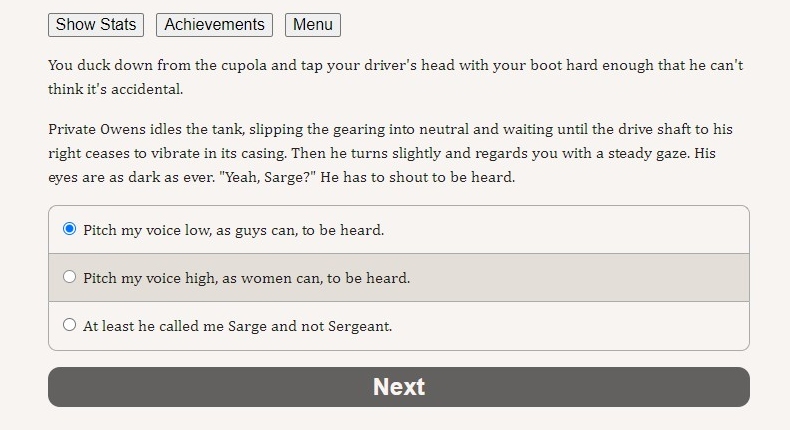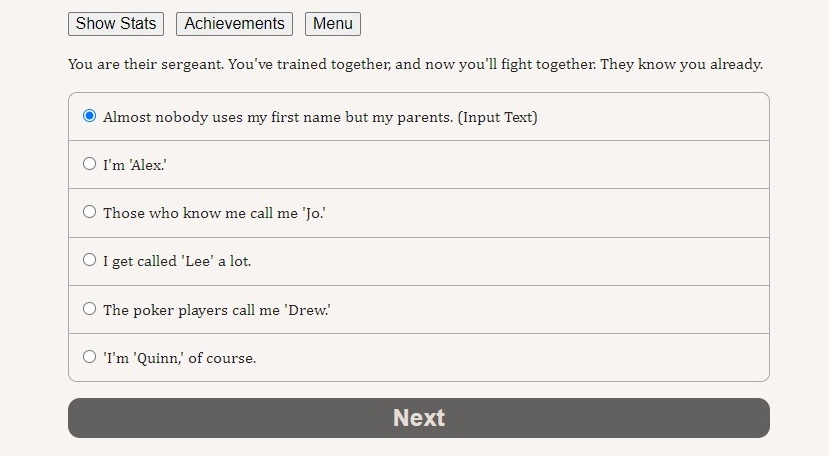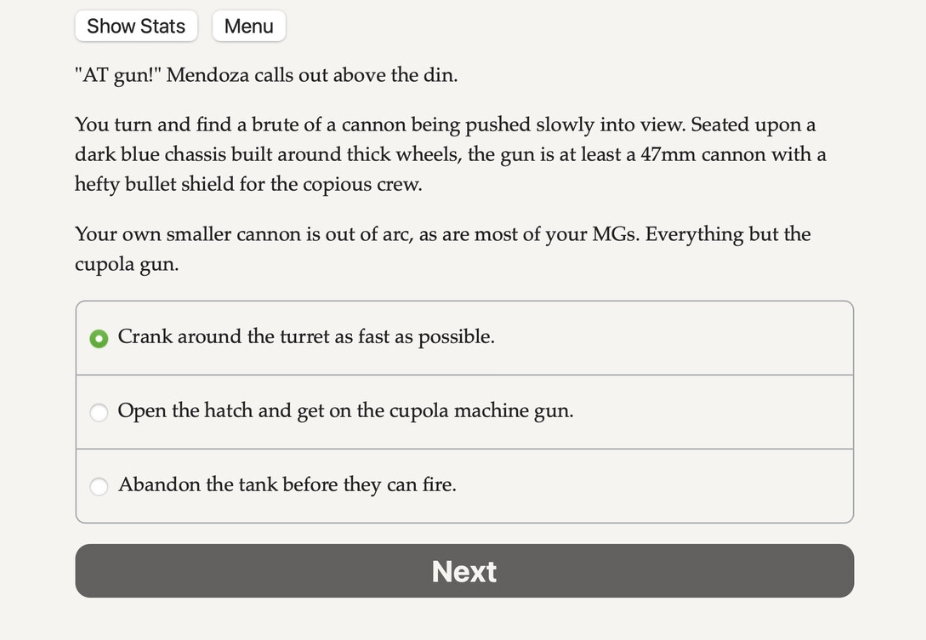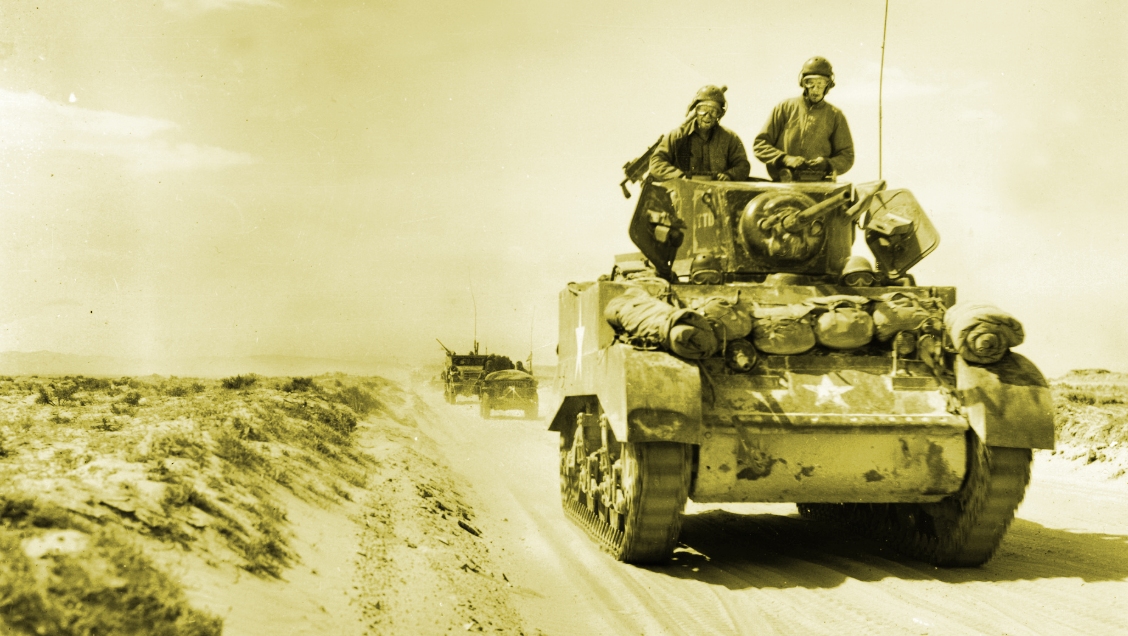Allen Gies, the writer behind much of Burden of Command’s vivid prose, has penned a 900,000 word interactive novel about tank warfare in North Africa. Hopefully, the excruciatingly daft moment early in World War II Armored Recon where you get to choose your character’s gender by selecting – I’m not making this up – the pitch of their voice, isn’t indicative of the game’s historicity or general attitude to women.

If you’ve been reading THC for a while you probably won’t be amazed to hear that I don’t think WW2 games need to, or should, pretend that there were female and non-binary US tank commanders in the 1940s.

In my experience, people drawn to history-steeped playthings like World War II Armored Recon aren’t usually attracted by the thought of validation or ahistorical representation. They are more likely to come for truths and atmosphere… glimpses into the past they can’t get from playing less scholarly fare. Implicit in WW2AR’s jarring gender choice is an assumption that female and trans women players will take offence or feel alienated if made to role-play – heaven forbid – men! It’s hard to imagine a more patronising or insulting assumption.

Or perhaps I’m just a hopeless dinosaur living in a comfortable bubble of cis male privilege. Maybe it doesn’t matter a jot if historical wargames and sims bend history a little in order to ensure the habitually excluded feel included?


100% agree Tim. If you’re going to write about history, or set something you’ve written in a historical context and not explicitly label it as not representing said history, then represent it as it was, not as modern sensibilities would perhaps like it to have been.
Ummm no, hard pass…said in a low pitched MANLY tone…
Women serving as ostensibly-male soldiers has a long history (NB. I don’t get to title Wikipedia pages)
https://en.wikipedia.org/wiki/Wartime_cross-dressers
but that page has no examples for regular armed forces post-WW1. So the concept isn’t invalid, just inappropriate for WW2.
It seems to have been particularly prevalent during the American Civil War
https://en.wikipedia.org/wiki/List_of_female_American_Civil_War_soldiers
and from now on I will demand that all ACW games/mods should have their Confederates playable as male or female.
I would say this is a quite subtle and discreet way to give a player a choice. Why be so upset to be given the choice at all? It’s a work of fiction. This site is mostly about ficiton and how they relate with facts. I’ve seen you give some leeway to historical accurateness if it improves a game. If this choice is meaningful to a potential player and he/she/it gains a better insight the story being told is there any harm done? For most of the younger generation this side of the channel (the bit with the Tulips) this choice is fine by them. If it gets them on board and makes them interact with it and history that is a small price to pay.
In my view and experience, historical fiction is fiction first and historically accurate second. So yes, Grumposaurus Rex. Let everyone play with their toys as they like.
Honestly? I am genuinely confused. “Pitch my voice low, as guys can”. I don’t think I would have any idea what to make of those options if presented to me, just very confusing.
I wonder how the curious voice selector is related to what one of the two steam reviews mentioned; “Characters aren’t thoroughly explored or detailed, there’s not really any personal stakes or story… it just feels like a series of combat engagements with no real purpose or stakes.”
I wonder if the developer was scared of committing to strong characters for fear of offending people…
How’s the rest of it?
The daftest thing is that the developer didn’t need to at any point state or acknowledge the player character’s gender.
‘Sarge’, ‘Sergeant’ and ‘Oy, you!’ are gender neutral and should cover most situations. Fill in with “ooh, someone’s grumpy” or “Sarge said to..” to avoid pronouns and you’re sorted.
A learning opportunity perhaps.
Hi Tim, I’m the writer for World War 2: Armored Recon. You wrote an engaging article. Certainly my own internal debate went along similar lines about how to balance history and accessibility. What to skip and what to include…
There was interesting feedback concerning the kind of officer a player could play in an older game of mine called Marine Raider. People who ordinarily would not bother with a military themed game or who avoided historical fiction, gave it a try because of the options. And many of them liked it enough to stay and play.
It warmed my heart to hear that in a hobby that feels like it is perpetually dying.
As you noted, those that wanted a more rigorous story could select the historical option. Others could indicate that their character is solely focused on their career, or try their hand at being the only woman in an active combat role for that particular portion of the U.S. military. A little bit of world building crept into Marine Raider because of that and would be transplanted to WW2:AR.
Did you enjoy the game? A number of small changes are planned based on reviews and emails. There may even be a new scene or encounter as feedback continues to accumulate.
Thanks for sharing your thinking, Allen.
Bringing new blood and perspectives into historical wargaming is certainly a commendable aim. However, I do wonder if distracting/confusing the majority of your audience, and distorting history for no obvious narrative purpose, is too high a price to pay to achieve that.
If picking a female or NB avatar had meaningful consequences… if, say, it lead to scenes exploring misogyny or period attitudes to masculinity and machismo, I could perhaps see the sense in providing the option. However, by the sound of it, in WW2AR it’s simply a way for an NB or female player to get a token validatory head pat… a “You’re welcome and accepted here”?
I intend to get stuck into WW2AR this weekend and will post something resembling a review next week. As I thoroughly enjoyed the writing in BoC, that review probably won’t be dominated by reflections on your gender choice screen!
“If picking a female or NB avatar had meaningful consequences… if, say, it lead to scenes exploring misogyny or period attitudes to masculinity and machismo, I could perhaps see the sense in providing the option.”
I think that’s a great opportunity to make this a more meaningful choice, especially in interactive fiction. Jason Morningstar’s tabletop RPG Night Witches (https://bullypulpitgames.com/products/night-witches) specifically centers on the experience of Soviet women, including misogyny and homophobia they experienced from their government and peers. Similarly the LARP Lumberjills (https://unrulydesigns.itch.io/lumberjills) looks at British and Commonwealth women’s experiences on the homefront. Both of these games are intersectional in that it’s not possible to separate a character’s gender/nationality/race from their lived experiences.
At the same time, not every game needs to be about oppression. There’s no mechanics for genocide or murdering Polish/Russian/Czech/etc. civilians or “foraging” in Gary Grigsby’s War in the East despite the fact that a fair amount of the time that’s what the German soldiers were doing.
If players can play German Soldiers, many of whom were also Nazis, and separate themselves from the historical realism of the millions of atrocities committed, then I think they can handle the cognitive dissonance of one female tank commander.
(Tim is also part of this conversation) Really hadn’t thought that people wanted this in the game. As originally envisioned, WW2AR was intended to cover the difficult fighting in North Africa where logistics was slender and doctrine still evolving. And for most GI’s and officers, this was also their first brush with combat.
And there were setbacks too. Serious setbacks due to command difficulties, which is to say Anderson and Fredendall.
But if we were to explore masculinity in WW2, particularly as it involves leadership, there a number of aspects to explore.
Aggression: A commander has got to be willing to hit the enemy when they can or he’ll hit you when he’s ready and you’re not.
Competition: Everyone loves a winner. However, there’s a great little story about four howitzer teams racing ahead to be the first to deploy and engage the Germans. They did deploy… in full view of the Germans. Afterward, the chagrined survivors retreated. (Atkinson, An Army at Dawn, page 258). So, competition has to be channeled properly or it is just lethal bravado. Worth a scene if a player manages a number of panzer kills… or has multiple tanks shot out from under them.
Stoicism: A tricky one too because this can be a side effect of combat stress where people just shut up and shut down. Being willing to accept the hardest of burdens and not whine uselessly about it does not come naturally for some. Discussion/introspection scenes come about because of this, but those sections could be more clearly flagged and expanded.
Toughness: This one rides shotgun with Stoicism. Being able to endure conditions and depravation, little water, indifferent food, constant danger, and the desert in general. This one at least should be well represented in WW2:AR.
Independence: There may not be an ‘I’ in team, but the spirit of orders must be considered when command is out of radio range. Being able to operate on your own is an important skill as a number of missions take the player away from the tank platoon and your men must rely on you and each other out in the middle of the desert. An additional scene or two where the player tries to contact command for orders only to be confronted by static (and having their crew react to that) would be an appropriate way to further develop this theme.
Any other ideas or things people thought were missing? This is more diverse feedback than the demo had gathered.
You touched on leadership then explored individualist attributes.
You can almost ignore the lot if you have leadership – the cliched ‘everybody doing the wrong thing together has more chance of success than people doing the right things in a disjointed way’ (sorry, can’t find the proper quote).
But leadership goes beyond command and control. Attributes of leadership are (off the top of my head) vision, communication, recognition, compassion, ownership (of problems), emotional intelligence, forward looking, enabling others, coaching, demonstrating the right behaviours, being able to listen and in a combat setting combining all of those into decisive action.
I almost couldn’t believe it when I read the first few paragraphs — it was as if this was an April Fools or Halloween episode — because no greater Moby Dick of a divisive culture war issue could Mr. Gies’ poor dialog tree represent to Tim, our dear Captain Ahab.
First I’ll say I’ve been playing through this and enjoying it a lot – especially the amount of focus on non-combat situations: the maintenance, the R&R, scrounging / stealing supplies. As the author mentions above it’s a really fascinating period and theater of the war and what I’ve played so far really brings it to life! Highly recommended from me.
As to the gender selection – one thing to note is that the publishers of the game (Choice of Games) put out a lot of choose your own adventure text games using this same format, some under their own label and others (like this one) under a ‘Hosted’ label, which is open to anyone who can write a game with their ChoiceScript code language and get it through a sort of public review (https://www.choiceofgames.com/looking-for-writers/write-a-hosted-game/). There’s a wide variety of settings on there (some very cool stuff) but I’d say fantasy stories are most common.
It is extremely standard for all games they publish to include a gender selection segment near the start of the game. I think it’s not specifically required, but I can see why Allen would include it because the main audience who probably play many Choice of Games games would naturally expect it. So it’s not just a theoretical audience who might appreciate these gender options, but a whole company fanbase who have probably not seen many historical war stories and are very used to being able to choose their gender in the stories they do play. This is getting long winded, but I think Allen made absolutely the right choice here and I don’t believe it takes anything significant away from the overall historical authenticity of the story.